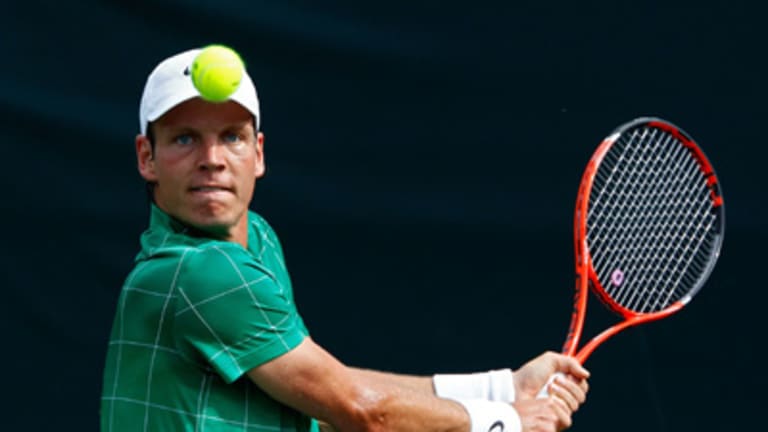Because of the result, we can say that the big Czech's caution to the wind approach was the right way to go, the smart, proactive play. After all, “be aggressive” is the default strategic position recommended to all professional tennis players, no matter what the circumstances. But if Berdych had missed one of those two forehands, thereby losing the match and reinforcing his reputation as one of the game’s foremost head cases and wastes of talent, we would have said that his tactic was reckless, that it was inevitable that he would choke, and that the great Roger Federer would prevail in this pressure moment.
Obviously, both of these assessments can't be correct. Was it just dumb luck that Berdych made those forehands and Federer subsequently committed a routine error to end the match? No, that’s not true either—execution is a function of correctly gauging what you can do at any given moment. And this was a special moment for Berdych. On the previous point, he had nervously guided a forehand up the line that the side linesman, after initially signaling that the ball was good, called wide. Berdych challenged and walked to the net. He appeared sure that his shot had landed in. Hawk-Eye indicated that it had been wide by the narrowest sliver possible. Berdych stared at the court for a long time before walking back to the baseline. Along the way, he caught his coach’s eye and the two of them shared a wide smile that began ruefully but ended up seeming almost giddy. Berdych got down in his return stance with a look of happiness on his face, all tension gone from his body.
The moment reminded me of the last holes of a Masters golf tournament a few years ago, when Phil Mickelson, after being wound tight for four days, suddenly began to smile with relief, right at the moment when he knew he couldn’t win the tournament. A natural reaction, in some ways, but it also seemed to me to be the definition of an athlete who's unable to enjoy competition—it didn’t matter whether he’d won or lost, Mickelson was just happy that it was over. The same was true for Berdych once Federer reached match point. The Czech, who had been up 4-2 in the third and who by all rights deserved the victory, could finally relax. By guiding that forehand wide, he’d already choked. The worst was over.
But in this case Berdych, also a guy who doesn't thrive competitively, had one more chance. What he did right, and intelligently, was to gauge his frame of mind and choose his shot from there. The ice had broken inside this normally chilly player, and aggression really was the smart way to go. He was much more likely to execute a risky forehand at that moment than he was when he was ahead.
Berdych's attitude and shot selection at this moment compared favorably with his opponent in two ways. Federer later said that his timing had been off, but he never made any concessions to that fact during the match. He continued to hit for the lines, even as he piled up 61 unforced errors—to be fair, you can’t play all that conservatively against Berdych, who is absolutely lethal when he has time to set up. From an emotional standpoint, where Berdych enjoyed the moment in the end, Federer looked, as he had looked earlier against Florent Serra, like he would rather have been pretty much anywhere else. I’m sure he cared and wanted to win, but his aura in general was one of irritation, even disdain, at not being able to do everything he wanted, rather than one of determination to win anyway. This isn't a new look for Federer, but for me last night, it made watching him a chore—he was the one who couldn't enjoy the competition. It’s also not a new or alarming result for Federer. Hard as it to believe, he hasn’t reached the final of either Indian Wells or Key Biscayne since 2006. But he’s come back to win plenty of Slams over those years. At the majors, Federer has more time to find his game, and more motivation to do what it takes to survive even when he can’t.
Normally it’s Berdych, not Federer, who is a chore to watch. A few years ago, he was yet another guy who I saw on a deep side court and believed was the real thing, a future Slam contender. He had the height, he had the timing, he had the smoothest power for a big guy since Marat Safin, he even seemed to have an even-keel demeanor. Like dozens of other sure shots, Berdych turned out to be a disappointment. His face a stony mask, he played a soulless brand of tennis; I got the feeling he couldn't put himself on the line emotionally. Either he had it on a certain day, or he didn’t. “Finding a way to win” was not a phrase that cropped up alongside Tomas Berdych’s name very often, if ever. On Tuesday night, at least, he found a way to win. He did it by breaking the ice. He did it with a smile.
